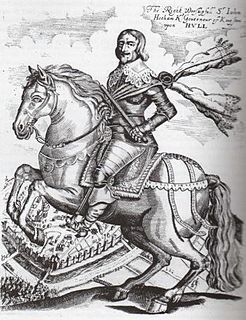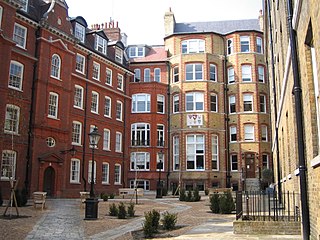Christopher Hatton, 1st Baron Hatton KB PC FRS was a distant relation of the Elizabethan politician, Sir Christopher Hatton and a prominent Royalist during the reign of King Charles I of England.

Sir John Hotham, 1st Baronet, of Scorborough was an English politician and Member of Parliament, who was governor of Hull in 1642 shortly before the start of the English Civil War. He refused to allow Charles I of England or any member of his entourage to enter the town, thereby depriving the King access to the large arsenal contained within. Later in the Civil war he and his son, John Hotham the younger, were accused of treachery, found guilty and executed.

Sir Harbottle Grimston, 2nd Baronet was an English lawyer and politician who sat in the House of Commons at various times between 1640 and 1685 and was Speaker in 1660. During the English Civil War he remained a Parliamentarian but was sympathetic to the Royalists.

Sir Orlando Bridgeman, 1st Baronet, SL was an English common law jurist, lawyer, and politician who sat in the House of Commons from 1640 to 1642. He supported the Royalist cause in the English Civil War.

Sir Thomas Chicheley was a politician in England in the seventeenth century who fell from favour in the reign of James II. His name is sometimes spelt as Chichele.
Sir Philip Stapleton (1603–1647), of Warter-on-the Wolds in Yorkshire, was an English Member of Parliament, a supporter of the Parliamentary cause during the English Civil War. His surname is also sometimes spelt Stapylton or Stapilton.

Thomas Fanshawe, 1st Viscount Fanshawe KB was an English politician who sat in the House of Commons at various times between 1621 and 1661. He supported the Royalist cause in the English Civil War. Following the Restoration he was raised to the peerage.
Sir Richard Buller (1578–1642) was an English politician who sat in the House of Commons variously between 1621 and 1642. He was a Parliamentarian officer during the English Civil War.
Baptist Noel was an English politician. He was a Member of Parliament (MP) for Rutland.
The Honourable Henry Belasyse (1604–1647), also known as Henry Bellasis was an English politician who sat in the House of Commons of England variously between 1625 and 1642.
Thomas Standish was an English politician who sat in the House of Commons between 1640 and 1642. Standish was a zealous Parliamentarian.
Sir John Evelyn was an English politician who sat in the House of Commons variously between 1626 and 1660.

Thomas Fanshawe (1533–1601), was a Member of the English Parliament during the reign of Queen Elizabeth I. He also held the civil service post of Queen's remembrancer of the exchequer.
Sir Thomas Cheek, Cheeke or Cheke was an English politician who sat in the House of Commons in every parliament between 1614 and 1653.
Sir Thomas Bludder was an English politician who sat in the House of Commons variously between 1621 and 1640.
Sir Capell Bedell, 1st Baronet was an English politician.
Sir Christopher Hatton KB was an English politician who sat in the House of Commons between 1601 and 1614.
Sir Benjamin Ayloffe, 2nd Baronet was an English landowner and politician who sat in the House of Commons from 1661 to 1662. He supported the Royalist cause in the English Civil War.











